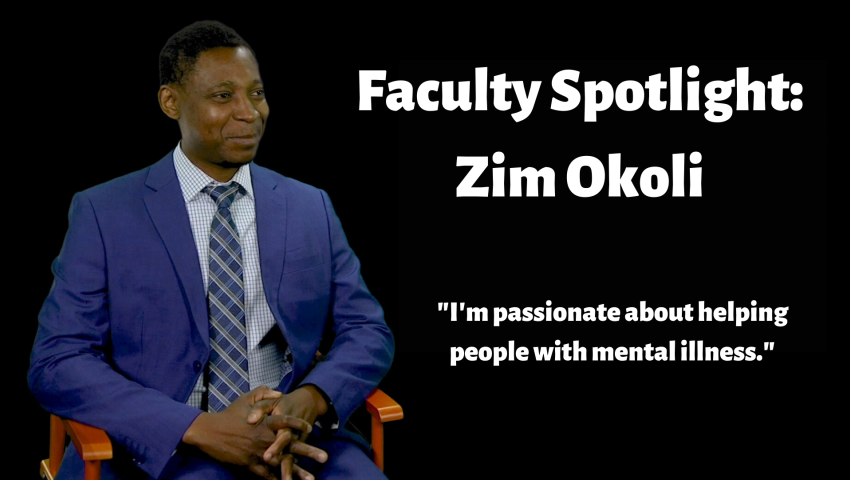
Faculty Spotlight
Dr. Okoli is a psychiatric nurse who works with patients with severe and persistent mental illness. He is also a part of the BH WELL faculty team. He is interested in finding programs to help the long-term health and wellbeing of patients with mental health illnesses. It is important to note that mental illness is a unique and complex challenge that no one chooses for themselves. Those with mental illnesses do not have access to as many resources such as funding or research. Dr. Okoli is passionate about keeping patients stabilized after leaving the hospital so they maintain a healthy lifestyle and remain well long term. He strives to ensure that these patients do not “fall through the cracks” in the medical healthcare system. The challenge is to do good science while also doing relevant work. A piece of advice he has found most helpful is that many people will convince you to join their research team but you must stick to your own passion to have a long lasting career. He is inspired by Dr. Ellen Hahn who researches health policy with a concentration on tobacco use and has helped develop smoke free laws in Lexington.
Read Transcript
Chloe: Welcome to the BH WELL video blog I'm Chloe Robertson, your host. BH WELL stands for Behavioral Health Wellness Environments for Living and Learning. Today on the vlog we're excited to spotlight Dr. Zim Okoli who is a part of the BH WELL faculty team. Hi, Dr. Okoli.
Dr. Okoli: Hi, Chloe. How are you?
Chloe: Good, how are you?
Dr. Okoli: Well, thank you.
Chloe: Could you please tell me a little bit about you and your research interests?
Dr. Okoli: Well, that's a good question, I have a lot of research interests but I'm a psychiatric nurse. I have most of my experience in nursing working with people with severe and persistent mental illnesses. So a lot of my research is about understanding factors that affect their health and well-being and finding ways to develop programs that can help them in their process of recovery.
Chloe: That's very neat. Why are you passionate about this area?
Dr. Okoli: Well, you know, mental illness is one of those things which a person doesn't ask for and we don't have as many resources in terms of funding or even a lot of evidence in how to help individuals living with mental illnesses. So I’m really passionate about this through my experience working in an inpatient hospital setting and observing people with mental illnesses just struggling to go through getting stabilized after a crisis and then after their stabilized they go back into community they go back into a lot of situations that may have perpetuated or caused their mental illnesses and they come back to the hospital. So just trying to shut that revolving door to find ways that we can help them not just get stabilized but maintain their lifestyle under quality of life and also achieve recovery.
Chloe: What do you want the public to know about your research?
Dr. Okoli: Our research is multi-dimensional, multi-faceted. It goes anywhere from health policy to very specific program planning program development. And our research is just really to find out ways to help individuals to stay well, particularly their behavior, and their mental wellness. It's an exciting journey to be on, learning not just from our expertise and our training, but also hearing from people living with mental illnesses, care providers who care for these individuals, and finding ways to create innovative and creative research processes they can ensure wellness in these populations.
Chloe: What is the most challenging part of your job?
Dr. Okoli: I think the most challenging part of our job is having a balance between doing good science, using what we know works the methods that we know can help us inform evidence, but also making sure that our work is relevant. I may have some ideas of what I think are important but if it's not coming from the people who need our services then I may be doing research that is really not relevant. So I think the hardest or the most challenging part of our work is making sure what we're doing remains relevant.
Chloe: What is the most helpful advice that you've received?
Dr. Okoli: The most helpful advice I've received is we have a lot of passions and people always vie to get you with their passion, but you have to stick to what makes you passionate that advice was given when I was a doctoral student and I was trying to figure out the research topic to do but a mentor just told me you have to do what you're passionate about because that will sustain your research career.
Chloe: Who or what has influenced you most in your work?
Dr. Okoli: I have a lot of influences but the person I think he's influenced me the most is Dr. Ellen Hahn. She's a professor at the UK College of Nursing and she was my mentor. She taught me everything I know about research and health policy. I cannot speak enough about her. But what inspires me about her is her ability to continue doing really good research that has impacted so many people. Her research is about health policy, mostly about tobacco use. She was very instrumental in bringing a smoke free or tobacco free law into Lexington and that has had tremendous impact in the quality of life of people.
Chloe: Well, thank you Dr. Okoli for sharing why you're passionate about your research.
Dr. Okoli: Thank you Chloe.